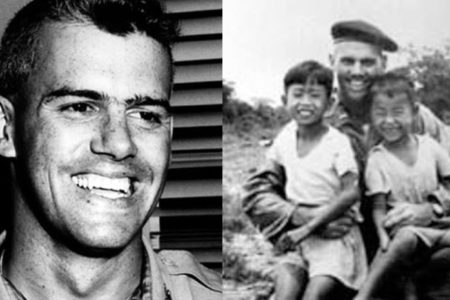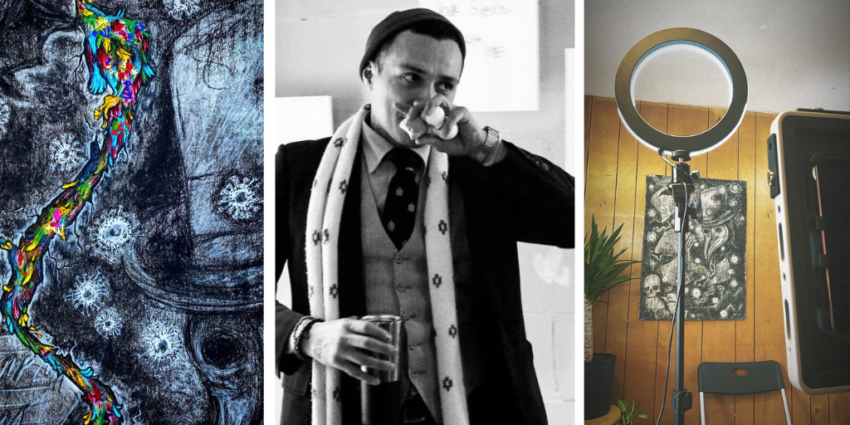
Share On Social!
Art can convey a story or a message.
So what if you could use art to spark a conversation about issues in your community?
That’s the question that Bobby Marines asked himself when realizing he could use his talent to lead important conversations in the Latino community.
To find the answer, Marines launched Voces y Visiones, a web series that features Marines’ art to lead a conversation about hot topic issues within the Latino community, with the help of the Southeast Minnesota Arts Council (SEMAC) and Alliance of Chicanos, Hispanics and Latin Americans (ACHLA).
“The overall goal is to use arts as catalysts for social and community discourse,” Marines said.
From Eighth Grade Dropout to Successful Visual Artist
It took hitting rock bottom for Marines to find his passion.
Marines grew up in Robstown, Texas. He struggled with mental health and school, dropping out in the eighth grade.
“I reached a day where I was literally on the verge of ending my life. Like, everything was done. I had nothing left to give, I had nothing left to do. I just reached that absolute bottom,” Marines said.
It took realizing that he had nothing to lose to pursue his passion in art.
“Something switched in me. I was like, ‘What if I just go full throttle with the one thing I’ve always liked?’ And I’ve always liked making things. Art. I was like, ‘What if I take that one little sliver of hope and apply every cliche I’d ever heard to that?’ Believe in your dreams, put your mind to it and you can do it. I’m like, ‘What if that’s real?’ I have nothing to lose at this point,” Marines said.
He dove into art without looking back.
A move to Minnesota and a fresh change of scenery helped with that too.
“I came to Minnesota and started dumpster diving for canvases and just making things, being as resourceful as possible,” Marines said.
Since then, Marines has worked as full-time artist and community organizer in Rochester, Minnesota.
The idea for Voces y Visiones came after a successful virtual art gallery put on by the Soo Visual Arts Center (SooVAC) in September 2020 turned into a discussion about Chicano issues.
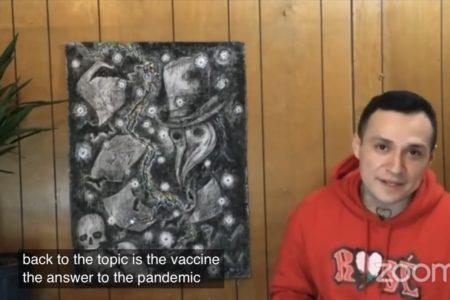
“SooVAC in Minneapolis got ahold of me. They were doing the virtual stuff. They said, ‘Hey Bobby, do you want to do something for the gallery?’ Yeah, that’s cool. But at the same time, everybody’s doing that, and by then, everybody was already Zoomed out. So I was like, ‘What if I bring a friend of mine, and we just start talking about the stuff that I’m talking about in my art?’ So I brought my buddy, Lael Martinez. He’s from South Central LA and I’m from Texas, so we were talking about the Chicano experience across the board,” Marines said.
Marines had people tuning in from across the country to watch the show. The audience loved it, asking for more discussion and to make it into a series.
Marines enjoyed blending important conversations with art, so he got to work creating the show.
How Voces y Visiones Episodes are Created
Through an Arts and Cultural Heritage Grant from SEMAC, Marines received funding to start Voces y Visiones.
The show launched in early 2021. He released the first episode on trauma and PTSD within the Latino community in February, and the second about COVID-19 vaccines in March. Trauma and COVID-19 are both impacting the Latino community.
Marines plans each episode far in advance. He recruits guests with his business partner, Miguel Valdez, who works as a community-engaged research liaison with the Mayo Clinic in Rochester.
“It always starts with the topic. And then from there, Miguel gets different organizations,” Marines said.
For their episode on vaccines, Marines spoke with doctors from the Mayo Clinic who specialize in Latino health disparities and Spanish-speaking populations.
After recruiting the guests, Marines creates the artwork and his team promotes the upcoming episode.
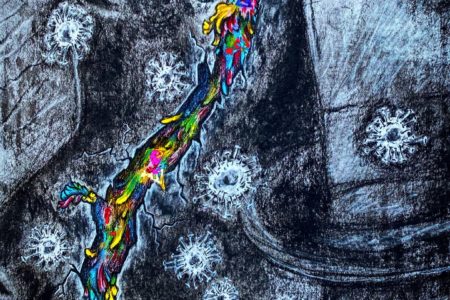
“I make the artwork and I have my cousin, who runs the social and the website. And as soon as we have the information and the topic, I have her update that and post everything. And then one to two weeks before the episode, we release the name, the bios, pics, resources, links. And we put that out everywhere,” Marines said.
Marines has plans for episodes on a variety of different topics, including incarceration, Latino identity, nutrition, Chicana feminism, and financial literacy.
He wants to spark conversation about hot topics and relevant issues, because he knows that can make a difference in people’s lives.
Making a Difference and Addressing the Stigma Against Mental Health
Marines is inspired by his own personal experiences to help people who may be struggling with different issues.
“There’s a push and a pull. My history and everything that I’ve personally survived and the people that I know, whether it was growing up around divorce, poverty and gang violence or gang culture, drug culture, growing up with everything that I’ve gone through and knowing that a lot of my loved ones still go through these things, that pushed me. What pulls me is what’s possible for people. I went through so many self-transformations along the way to get to this point, and I want to inspire that same thing to people who are still struggling with that and still living those realities that I once did,” Marines said.
Marines wants to give Latinos a voice who are struggling to navigate street and gang culture.
“We can do the Latinx voice, but there’s also something very specific about the street culture within that, like the Chicano gang culture, the street culture, the felons and the addicts. A lot of my loved ones still have to navigate those realities. And I know that it’s possible because I’ve done that transformation within myself,” Marines said.
He also wants to tackle the stigma that prevents people within the Latino community from seeking help for mental health issues.
“It’s crazy, because deep down, everybody wants to talk about it. Everybody wants to share, wants to not feel alone, or not feel like they have to suppress something within themselves, and something so significant. I feel like a lot stems from PTSD. You could talk about the incarceration episode, you could talk about any episode, even the vaccine trust issues. It ties into our perspective of the world and society and ourselves. What we’re capable of, our own potential, it all stems from things that tend to be psychological and traumatic, and that translates into how we navigate the world,” Marines said.
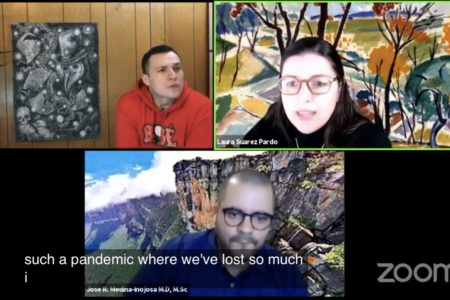
We can address the stigma by empowering people who speak up about difficult topics and struggles, according to Marines.
Treat it like a cool thing to be vulnerable, not weak.
“I feel like changing that narrative, having that switch is so important. Especially in our communities, when we have those issues of trust and trauma and things like that, it’s all delivery and approach. Our walls are so thick, to even get through to us, that just has to happen right off the top,” Marines said.
Having trusted leaders starting these conversations within communities is also key.
“The leader has to be entrusted, an entrusted voice for and with the people that they’re trying to talk with the community,” Marines said.
What’s Next for Voces y Visiones?
Voces y Visiones will continue releasing episodes every second Wednesday of the month at 6pm CT on Zoom and Facebook.
Marines is also working with Miguel to publish a study on the impacts of Voces y Visiones on his audience.
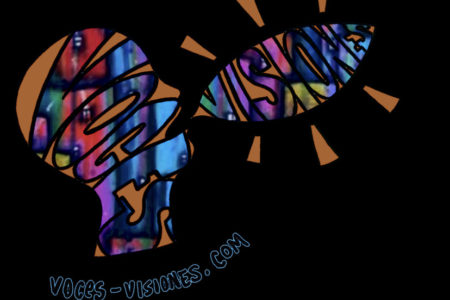
“We’re doing a study on the impact of Voces y Visiones and how art can be used as narrative communication and storytelling, how that can affect behavioral change and societal change and things like that. So we’re trying to connect those two, with the format that we’re using and we’re just trying to publish that,” Marines said.
But once the COVID-19 pandemic is over, Marines is excited to have in-person exhibitions.
“Of course, we’re gonna play it by ear, make sure everything’s safe,” Marines said. “But I mean, me coming from a background of community organizing and events and putting on shows, I want to have a Voces y Visiones exhibition. We’re seriously just getting started.”
By The Numbers
3
Big Excuses
people use to justify discriminatory behavior
This success story was produced by Salud America! with support from the Robert Wood Johnson Foundation.
The stories are intended for educational and informative purposes. References to specific policymakers, individuals, schools, policies, or companies have been included solely to advance these purposes and do not constitute an endorsement, sponsorship, or recommendation. Stories are based on and told by real community members and are the opinions and views of the individuals whose stories are told. Organization and activities described were not supported by Salud America! or the Robert Wood Johnson Foundation and do not necessarily represent the views of Salud America! or the Robert Wood Johnson Foundation.

